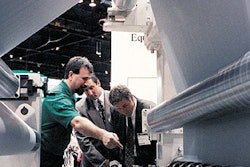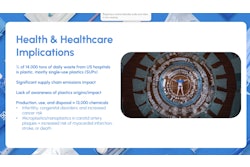Success in the People's Republic, with its current political structures and cultural history, is only achieved through long-term investment, not an expectation of short-term gain. China represents an untapped domestic market providing global businesses with unprecedented growth. More importantly, China provides opportunities for companies to expand their research and development and strategic business objectives in new global fronts. Here is a look at what is going on with one pharmaceutical company that is growing in China: Shanghai Roche.
This is a milestone year for Shanghai Roche, which is celebrating 10 years in the Pudong region of the People's Republic of China. Shanghai Roche employs about 2,100 associates-1,700 in pharmaceuticals, and 400 in diagnostics. The campus covers 54 sq kilometers. Most impressive is that this facility exemplifies what many in the industry see as the future of global research and manufacturing: The growing biotechnology sector.
Prior to my trip to the country, I believed that the primary opportunities in China centered on low-cost manufacturing labor for products exported to countries such as the U.S. But I quickly realized that the culture, and the opportunities for biotechnology, are much more complex in this country than labor costs.
It is not insignificant that Roche built its fifth global R&D center in Shanghai-a major statement about the company's commitment to the Chinese market. The facility is described as a "center of excellence" by Fariborz Ghadar, Professor of Global Management Policies at Pennsylvania State University's Smeal College of Business and author of "Global Tectonics: What Every Business Needs to Know." Manufacturing and packaging operations are in China, but it is not the driving focus of why Roche is there, Ghadar says.
Long-term investments
Also not to be overlooked is what Roche has been able to accomplish in China during the past decade. "Business in China is very personal. It takes a long time," says Ghadar. "Roche has built its presence there through strategic alliances, its subsidiary Genetech, Chugai Pharmaceuticals, and with the university system. They are very active there, and the Chinese government is making huge investments in biotechnology."
Roche has invested heavily in China in infrastructure and resources, and perhaps most importantly in developing relationships with all stakeholders: members of the centralized national government, the more autonomous business region of Shanghai, and Roche employees.
The return on this investment is that Roche is now poised to achieve its global mission of becoming the leading healthcare innovator. Roche no longer considers itself in the "drug business." While most assuredly dependent on pharmaceuticals for current revenues, the company's future vision is to position pharmaceuticals as a "delivery mechanism" in its goal to provide what it terms "differentiated medical solutions" for oncology conditions such as cancer, AIDS, Alzheimer's, and diabetes. There is a strong commitment to business development focusing on personal healthcare, specifically through predisposition, and early detection and prevention. Its developing diagnostic capabilities drive strategic and operational decisions for this company, which is ranked as the number five pharmaceutical manufacturer, and number one in diagnostics, according to Jassy Gua, director of corporate communications for Roche in China.
Global network
In fact, the Shanghai R&D center is a strategic part of Roche's global research network that includes R&D facilities in Europe, Japan, and the U.S. In addition to allowing the transfer of knowledge and expertise globally, Roche is able to leverage the absence of restrictive and regulatory policies in other parts of the globe that make it more costly to produce and operate. The Shanghai center allows Roche to accomplish discovery efforts faster, more efficiently, and in a more cost-effective manner. Roche is also able to maximize the return on its numerous patents and many Nobel Prize-winning technologies, including research in replicating genomes.
Roche collaborates with the Chinese National Genome Centers in Shanghai and Beijing on genetic studies serving research efforts for predisposition for conditions such as diabetes and Alzheimer's disease. Not surprisingly, genomics research is much more easily accomplished in China compared to other parts of the world as there are not the same political or social objections as in other markets, and Chinese Universities produce highly educated researchers to support this pioneering science.
This does not mean that Roche is developing drugs in China unethically or to a lesser standard. On the contrary, Roche states that it is through the management of its global operations and supply chain, and the consistent application of global standards of ethics and quality, that Roche is able to deliver consistent healthcare solutions to its consumers worldwide. All of Roche's suppliers in China must be sourced from its group of approved global suppliers, which are audited and tested routinely throughout the year for quality and safety. They are held to consistent standards for both Western and Eastern markets. That increases the importance of selecting preferred vendors and partners. It also shines a light into the future of corporate responsibility and to a time when regulations may not be established by independent governments, but by a global regulatory organization, or by the corporations themselves.
Also meeting global standards are the highly qualified scientists and researchers joining the Roche Shanghai R&D center via the Chinese university system. Their knowledge and skill are equally matched to that of other parts of the globe, but in a country where the emerging middle class annual income is currently between $3,200 and $5,200, and rising. Obtaining skilled, educated researchers is much more affordable than in other global regions.
Roche also leverages its global capabilities in a manner that delivers local value to the domestic China market. Like nearly 60% of U.S. firms that enter China, Roche is growing and operating in the PRC because of the domestic opportunities there rather than a perceived low-cost country manufacturing advantage for export. And the business opportunities for Roche within the domestic market are significant. The business publication McKinsey Quarterly projects that between 2006 and 2012, the pharmaceutical market will grow by 20 percent annually at a time when the rates of growth in key U.S. and European markets is slowing.
Last year, Roche launched a Pharma Development Center in Shanghai to carry out clinical development activities. Until that time, drug development occurred in Europe and North America, and patients in China had to wait up to five years for medicines already approved in the U.S.
It is Roche's long-term commitment to China that provides its success in the East and the West. According to the U.S. Chamber of Commerce in China, those companies that come to China solely to exploit cheap labor costs and the lack of standards are typically not successful in the PRC. Those gains are quickly mitigated by factors such as currency fluctuations, value-added taxes, and energy costs.
Roche's long-term view of the market in China and its integration into its global strategy provides value to all shareholders. Last year, Roche's global strategy delivered its twenty-first year of dividend growth, a global sales increase of 10%, with operating gains up 22%.
Editors Note: Jody Jacobs is vice president of Global Account Services for CreataVivendi (www.creatavivendi.com), a multicultural marketing and consulting agency. Jacobs has more than a decade of experience in business-to-business marketing consultation to global manufacturing companies, including the healthcare and packaging sector. She recently completed her MBA from the Pennsylvania State University's Smeal College of Business, which included global business study in Shanghai this past April. A member of the Institute for the Study of Business Markets, Jacobs can be reached by e-mail at [email protected] or [email protected].
This is a milestone year for Shanghai Roche, which is celebrating 10 years in the Pudong region of the People's Republic of China. Shanghai Roche employs about 2,100 associates-1,700 in pharmaceuticals, and 400 in diagnostics. The campus covers 54 sq kilometers. Most impressive is that this facility exemplifies what many in the industry see as the future of global research and manufacturing: The growing biotechnology sector.
Prior to my trip to the country, I believed that the primary opportunities in China centered on low-cost manufacturing labor for products exported to countries such as the U.S. But I quickly realized that the culture, and the opportunities for biotechnology, are much more complex in this country than labor costs.
It is not insignificant that Roche built its fifth global R&D center in Shanghai-a major statement about the company's commitment to the Chinese market. The facility is described as a "center of excellence" by Fariborz Ghadar, Professor of Global Management Policies at Pennsylvania State University's Smeal College of Business and author of "Global Tectonics: What Every Business Needs to Know." Manufacturing and packaging operations are in China, but it is not the driving focus of why Roche is there, Ghadar says.
Long-term investments
Also not to be overlooked is what Roche has been able to accomplish in China during the past decade. "Business in China is very personal. It takes a long time," says Ghadar. "Roche has built its presence there through strategic alliances, its subsidiary Genetech, Chugai Pharmaceuticals, and with the university system. They are very active there, and the Chinese government is making huge investments in biotechnology."
Roche has invested heavily in China in infrastructure and resources, and perhaps most importantly in developing relationships with all stakeholders: members of the centralized national government, the more autonomous business region of Shanghai, and Roche employees.
The return on this investment is that Roche is now poised to achieve its global mission of becoming the leading healthcare innovator. Roche no longer considers itself in the "drug business." While most assuredly dependent on pharmaceuticals for current revenues, the company's future vision is to position pharmaceuticals as a "delivery mechanism" in its goal to provide what it terms "differentiated medical solutions" for oncology conditions such as cancer, AIDS, Alzheimer's, and diabetes. There is a strong commitment to business development focusing on personal healthcare, specifically through predisposition, and early detection and prevention. Its developing diagnostic capabilities drive strategic and operational decisions for this company, which is ranked as the number five pharmaceutical manufacturer, and number one in diagnostics, according to Jassy Gua, director of corporate communications for Roche in China.
Global network
In fact, the Shanghai R&D center is a strategic part of Roche's global research network that includes R&D facilities in Europe, Japan, and the U.S. In addition to allowing the transfer of knowledge and expertise globally, Roche is able to leverage the absence of restrictive and regulatory policies in other parts of the globe that make it more costly to produce and operate. The Shanghai center allows Roche to accomplish discovery efforts faster, more efficiently, and in a more cost-effective manner. Roche is also able to maximize the return on its numerous patents and many Nobel Prize-winning technologies, including research in replicating genomes.
Roche collaborates with the Chinese National Genome Centers in Shanghai and Beijing on genetic studies serving research efforts for predisposition for conditions such as diabetes and Alzheimer's disease. Not surprisingly, genomics research is much more easily accomplished in China compared to other parts of the world as there are not the same political or social objections as in other markets, and Chinese Universities produce highly educated researchers to support this pioneering science.
This does not mean that Roche is developing drugs in China unethically or to a lesser standard. On the contrary, Roche states that it is through the management of its global operations and supply chain, and the consistent application of global standards of ethics and quality, that Roche is able to deliver consistent healthcare solutions to its consumers worldwide. All of Roche's suppliers in China must be sourced from its group of approved global suppliers, which are audited and tested routinely throughout the year for quality and safety. They are held to consistent standards for both Western and Eastern markets. That increases the importance of selecting preferred vendors and partners. It also shines a light into the future of corporate responsibility and to a time when regulations may not be established by independent governments, but by a global regulatory organization, or by the corporations themselves.
Also meeting global standards are the highly qualified scientists and researchers joining the Roche Shanghai R&D center via the Chinese university system. Their knowledge and skill are equally matched to that of other parts of the globe, but in a country where the emerging middle class annual income is currently between $3,200 and $5,200, and rising. Obtaining skilled, educated researchers is much more affordable than in other global regions.
Roche also leverages its global capabilities in a manner that delivers local value to the domestic China market. Like nearly 60% of U.S. firms that enter China, Roche is growing and operating in the PRC because of the domestic opportunities there rather than a perceived low-cost country manufacturing advantage for export. And the business opportunities for Roche within the domestic market are significant. The business publication McKinsey Quarterly projects that between 2006 and 2012, the pharmaceutical market will grow by 20 percent annually at a time when the rates of growth in key U.S. and European markets is slowing.
Last year, Roche launched a Pharma Development Center in Shanghai to carry out clinical development activities. Until that time, drug development occurred in Europe and North America, and patients in China had to wait up to five years for medicines already approved in the U.S.
It is Roche's long-term commitment to China that provides its success in the East and the West. According to the U.S. Chamber of Commerce in China, those companies that come to China solely to exploit cheap labor costs and the lack of standards are typically not successful in the PRC. Those gains are quickly mitigated by factors such as currency fluctuations, value-added taxes, and energy costs.
Roche's long-term view of the market in China and its integration into its global strategy provides value to all shareholders. Last year, Roche's global strategy delivered its twenty-first year of dividend growth, a global sales increase of 10%, with operating gains up 22%.
Editors Note: Jody Jacobs is vice president of Global Account Services for CreataVivendi (www.creatavivendi.com), a multicultural marketing and consulting agency. Jacobs has more than a decade of experience in business-to-business marketing consultation to global manufacturing companies, including the healthcare and packaging sector. She recently completed her MBA from the Pennsylvania State University's Smeal College of Business, which included global business study in Shanghai this past April. A member of the Institute for the Study of Business Markets, Jacobs can be reached by e-mail at [email protected] or [email protected].




















